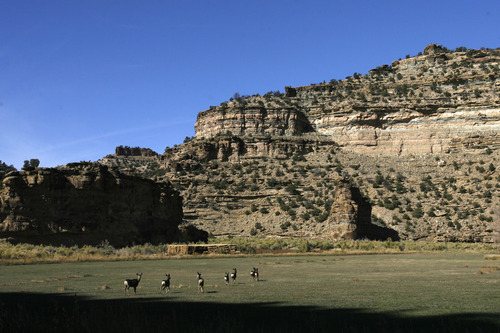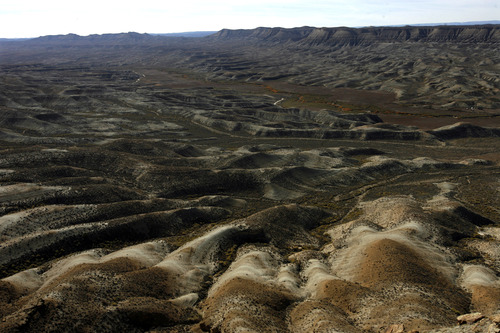This is an archived article that was published on sltrib.com in 2013, and information in the article may be outdated. It is provided only for personal research purposes and may not be reprinted.
Two decades ago, Utah lawmakers overhauled the way the state manages its trust lands after decades of abuses that robbed the beneficiaries of these publicly owned lands — Utah schools. The School and Institutional Trust Lands Administration, or SITLA as the agency is now called, has built a $1.6 billion endowment since the 1994 reforms through aggressive deal making to maximize revenue through mineral extraction, grazing and real estate development.
But in the wake of a surprise deal inviting oil exploration into cherished road-free hunting grounds in the Book Cliffs, many now wonder whether this progress has come at too steep a cost to the land and public interest. A growing body of critics — including Republican political leaders who normally champion energy development — contends this lease, made with zero public involvement, suggests the independent agency has lost sight of the state's larger interests for the sake of short-term gains.
An agreement reached Friday to delay a leasing decision on the roadless parts of the Book Cliffs, totaling 18,000 acres, has toned down the controversy, but questions remain about the absence of a meaningful public process backing decisions with such far-reaching consequences.
—
Out of the loop • "I don't have major qualms with their goal, but the way they go about it with no oversight and no accountability has got to change," said Lynn Jackson, vice chairman of the Grand County Council. "We have gone from one extreme and slid into another. It's time to bring this back into balance, so at the end of the day at least the governor can have veto power."
Jackson, a 32-year veteran of the federal Bureau of Land Management's Moab office, was deeply incensed SITLA never informed Grand County officials the Books were on the block, much less asked for their thoughts.
SITLA officials say the Book Cliffs deal, conducted without the competitive bidding normally done on oil and gas leases, can deliver $120 million a year to the permanent trust fund should Anadarko find substantial pools of oil in the Mancos Shale under the Books. Jackson pointed out that there is no way to confirm those numbers, nor any way to determine whether SITLA is getting the best price since other companies were not invited to bid.
And despite all of SITLA's progress in building an endowment, it has done little to lift Utah from the basement of education spending.
"There's one number nobody talks about. That number is 1 percent," said Jackson, referring to the portion of the education budget covered by the trust fund.
The agency's executives and its impassioned champions in the Legislature and education circles are steadfast in their belief in the wisdom and legitimacy of the decision to lease the Book Cliffs to Anadarko.
The political pressure blowing against the deal is setting back trust lands management a century, said Republican Rep. Mel Brown, the Coalville rancher who led the legislative effort to reform the system in the early 1990s. Those reforms were crafted to prevent executive and political meddling that ensured state lands were managed for the benefit of insiders and cronies rather than schools. Over the first century of statehood, Utah had sold off half its trust lands but had banked only about $50 million in the permanent school fund.
To improve returns off the remaining 3.4 million acres, an independent seven-member board was established, whose members are nominated from the ranks of energy, real estate and grazing. The current chairman is retired Boyer executive Steve Ostler.
"That board is made up of qualified businessmen and good-thinking men. They make good decisions and do not yield to political pressure," Brown said.
—
A mandate to make money • SITLA Director Kevin Carter, a 32-year veteran of the agency, said the kind of changes Jackson is seeking would invite gridlock and frustrate the agency's mandate to make money.
"The model he is advocating is the BLM model [which is subject to federal environmental policies]. Not a lot of people are happy with that model," Carter said. "It's a good model to allow extreme elements on both ends to get in and meddle."
Secrecy on the Book Cliffs deal was necessary because of Anadarko's business needs, he said. SITLA's bylaws allow for "other business arrangements," as opposed to competitive bidding, for selling minerals, but only with board approval.
Carter and other SITLA officials note the general public is not among the agency's beneficiaries, but it does look after environmental concerns, particularly endangered species protection, in special cases.
"We provide the largest block of habitat for desert tortoise," Carter said.
But a former SITLA executive, Ric McBrier, said he was "stunned" that his former colleagues failed to engage vital stakeholders in the Book Cliffs deal.
"We needed to balance making money for the trust with environmental considerations and other considerations for the long-term benefit of the state," said McBrier, who ran SITLA's real estate operations before retiring in 2007.
"It's in [SITLA's] best interest because it will maintain public support for the trust. For the 11 years I was there a governor never had to second-guess a decision because we were careful to balance things."
Working behind the scenes last week, Gov. Gary Herbert and Rep. Rob Bishop persuaded SITLA to postpone leasing the southern Books. They argued such a move is in the school trust's long-term interests because it would enable opportunities to consolidate SITLA holdings, which are typically scattered around the state in isolated 640-acre blocks.
For his part, the governor is withholding judgment on SITLA reform to see how the Book Cliffs deal is implemented.
"I think it unwise in the heat of this kind of conversation to call for anything. Let's go through the process, see what happens, then when everybody's kind of cool and calm, then take a look at it and say, 'Have we got what we want to have there?' " Herbert said. "If we do, then fine. If we don't, then maybe we'll call for some changes, but that's weeks down the road before I would feel comfortable doing that."
Matt Canham contributed to this report.





